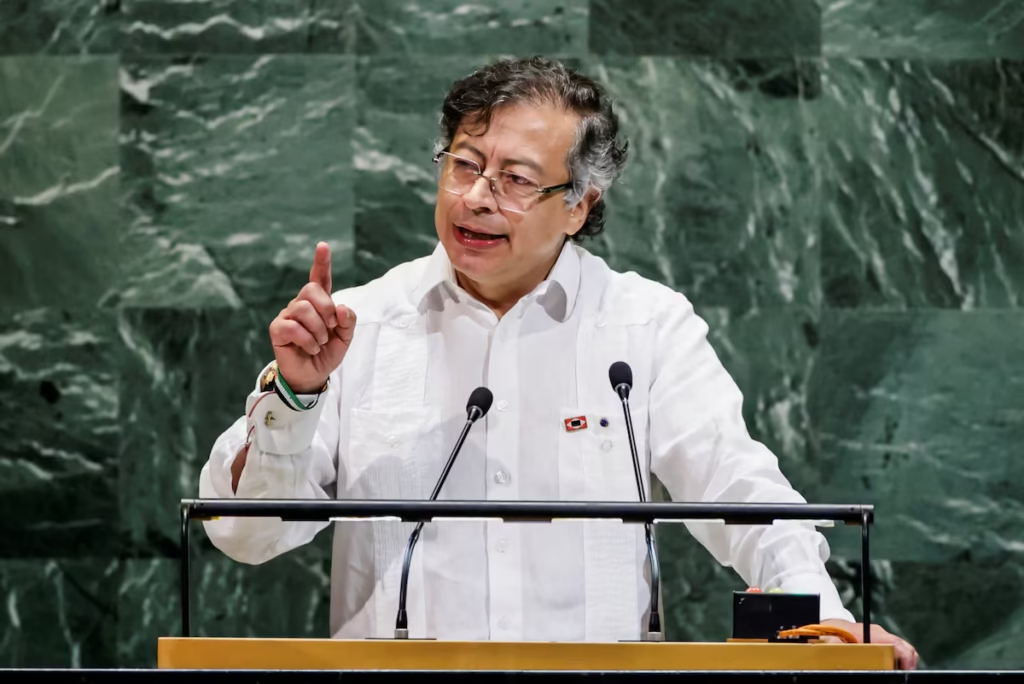ABOARD AIR FORCE ONE — President Donald Trump on Sunday intensified his confrontation with Colombia, vowing to raise tariffs and cut off all financial assistance to the South American nation, amid a growing dispute over U.S. military actions targeting alleged drug-smuggling vessels.
Speaking to reporters aboard Air Force One, Trump accused Colombian President Gustavo Petro and his government of complicity in the drug trade and claimed Bogotá had failed to act as a partner in the fight against narcotics. “They don’t have a fight against drugs — they make drugs,” Trump said. He added that his administration would announce higher tariffs on Colombian imports as early as Monday and would immediately halt all payments to the Colombian government.
It remains unclear what funding the president was referring to. Colombia was once among the top recipients of U.S. foreign aid in the region, particularly under anti-narcotics and security initiatives. But aid flows slowed dramatically earlier this year when USAID — Washington’s primary humanitarian agency — was shut down under Trump’s reorganization of foreign assistance programs.
Colombia currently faces a 10% tariff on most exports to the United States, a baseline rate imposed by Trump on many trade partners. He did not specify how high the new tariffs would go or whether exemptions would be considered.
The remarks came just hours after Trump labeled Petro an “illegal drug leader,” while Defense Secretary Pete Hegseth said U.S. forces had recently struck a vessel linked to a Colombian rebel group operating in the Caribbean. That vessel, officials claimed, was engaged in narcotics smuggling.
The Colombian government has strongly rejected those assertions. Petro said the boat destroyed by U.S. forces belonged to “a humble family,” not an insurgent group. Colombia’s foreign ministry blasted Trump’s comments as “offensive” and announced it would seek support from international allies in defense of Petro and the country’s sovereignty.
“These accusations represent an extremely serious act and undermine the dignity of the president of Colombians,” the statement read.
Disputed Military Strike Raises Tensions
The war of words follows a series of controversial U.S. military operations in the Caribbean, including drone and air strikes on boats Washington claims were engaged in drug trafficking. Defense Secretary Hegseth said in a post on X that the Pentagon had “destroyed a vessel and killed three people” on Friday in the U.S. Southern Command’s area of responsibility.
He linked the vessel to the National Liberation Army (ELN), a leftist guerrilla group involved for decades in political violence and the cocaine trade. But Hegseth offered no public evidence to support the claim. Petro and his government insist the boat was not part of any rebel operation and that innocent civilians may have been killed.
Legal experts and human rights groups have raised alarms over these missions, arguing they lack transparency and risk violating international law. Critics say the expanded use of military force at sea, without parliamentary or congressional oversight, could set a dangerous precedent in the region.
Earlier this month, Petro said another strike had hit a Colombian civilian vessel, a charge U.S. officials denied at the time.
Personal Attacks and Diplomatic Fallout
The dispute has veered into open hostility. Petro fired back at Trump on social media, saying Colombia had never been disrespectful to the United States, while calling the president “rude and ignorant” toward Colombians. “Since I am not a businessman, I am even less a drug trafficker. There is no greed in my heart,” he wrote.
Last month, the Trump administration revoked Petro’s U.S. visa after he participated in a pro-Palestinian rally in New York and publicly urged American soldiers to refuse Trump’s orders. That move sparked outrage among Petro’s supporters and drew criticism from advocacy groups that accused Washington of suppressing political speech.
Diplomatic relations between Washington and Bogotá, long rooted in counternarcotics cooperation and security assistance, have been deteriorating for months. Analysts note that while the two nations have clashed before, it is rare for a sitting U.S. president to personally attack a foreign leader with such forceful language.
Colombia’s Drug Crisis and Washington’s Shifting Strategy
Colombia continues to face deep challenges in curbing coca cultivation and cocaine production. Petro campaigned on a pledge to take on drug cartels, promising both social investment and targeted security operations in coca-growing regions. But progress has been limited, and critics say his policies have lacked clarity and enforcement.
Trump, meanwhile, has pushed a harder line on narcotics, authorizing direct strikes on maritime targets accused of ferrying drugs to Central America, Mexico, and the United States. Supporters of the approach argue it deters traffickers and compensates for weak local enforcement. Opponents warn it risks dragging the U.S. into new regional conflicts.
The administration’s shutdown of USAID and threat to impose higher tariffs could signal a broader shift in how Washington engages with Latin America. Aid once linked to anti-drug initiatives, rural development, and humanitarian programs may now be replaced by a confrontational policy driven by trade penalties and military action.
Uncertain Path Ahead
Colombia’s foreign ministry said it would appeal to international organizations to defend its autonomy and challenge what it described as a serious breach of diplomatic norms. Some lawmakers in Bogotá have urged a review of military cooperation agreements with the United States.
It remains to be seen how far the White House will go in escalating the dispute. If additional tariffs are announced, they could disrupt trade in sectors such as coffee, flowers, apparel, and metals — industries that rely heavily on U.S. consumers.
For now, neither side appears willing to back down. Petro has framed the confrontation as a matter of national dignity, while Trump has cast Colombia as a symbol of what he calls failed international partnerships in the war on drugs.
With human rights groups, legal scholars, and regional governments watching closely, the next round of actions — whether economic, diplomatic, or military — could determine whether the standoff turns into a full-blown diplomatic rupture.

